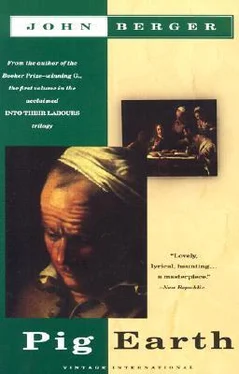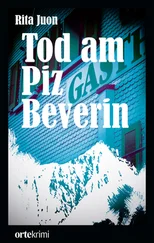Pépé began to talk with the pig in the stable. To each kind of animal Pépé spoke in a different voice, making different sounds. With the mare he spoke softly and evenly, and when he repeated himself, it was as if he was speaking to a companion who had become deaf. To the pig his language was full of abrupt, high-pitched sounds, interspersed with exhaling grunts. Pépé sounded like a turkey when he spoke to the pig.
“Ahir ola ahira Jésus!”
Whilst he made this noise, he fitted a noose round the pig’s snout, being careful not to let it tighten. The pig followed him obediently, past the five cows and the mare, through the stable door and into the sudden harsh light of the snow. There the pig hesitated.
All his life the pig had complied. Mémé had fed him as if he were a member of the family. He, for his part, had put on his kilo per day. One hundred and forty kilos. One hundred and forty-one. One hundred and forty-two. Now, for the first time, he hesitated.
He saw four men standing before him, their hands, not in their pockets to protect them from the cold, but held out in front. He saw my grandmother waiting in the kitchen doorway without a bucket of food. Perhaps he saw my mother staring with anticipation through the kitchen window.
In any case, he put his head down and with his four small feet beneath their gigantic hams, he stepped one step back. Pépé pulled the rope and as the noose tightened, the pig screamed and tried to back away. For an instant Pépé held the pig by himself. Nothing could drag him against his will. The next instant the neighbours were there pulling on the rope too.
Pépé’s friend Marius and I pushed from behind. Every feature of the pig, except his mouth, is small. His arsehole is no larger than a buttonhole in a shirt. I held him by his tail.
After five minutes of dragging and heaving, we had him across the yard, alongside the large wooden sledge. This was the sledge that killed my father.
Pépé and my grandmother had waited four years for a child. “The weather and the cunt,” Pépé said, “do what they want.” My father was their first-born. Two years later came my aunt. They had no other children. And so, as soon as he was old enough, Pépé needed my father to work. The sledge killed him when he was thirty and I was two. He was bringing down hay from the alpage. The path was steep and about three kilometres long. In places it was cut through the rock, in places it was muddy, in places it was paved with rough stones around sharp, heavily banked corners. We used this path to take the cows up to the alpage in June and bring them down at the end of September. When I helped Pépé drive them up, he never stopped at the place where his son was killed. There was an overhanging grey rock there, which bulged outwards like the side of a whale. Not on the way up, on the way down, in the autumn, we always stopped under this rock and Pépé said: “This is where your father lost the heart to go on.”
We needed to get the pig up on to the sledge, lying on his right side. During the struggle across the yard, he had planted his feet as hard as he could against the ground in order to resist being pulled by the rope and being pushed from behind. When he felt himself being toppled, his four legs lunged and searched for the ground with desperate speed and force and at the same time he yelled louder. Never before had he discovered his strength as he was discovering it now.
The men threw themselves on him. For a moment he was invisible beneath the heap of men, and he lay still. I could see one of his eyes. The pig has intelligent eyes, and his fear was now intelligent. Suddenly, lunging and kicking, he fought like a man, a man fighting off robbers.
During the next twelve months he was going to give body to our soup, flavour our potatoes, stuff our cabbages, fill our sausages. His hams and rolled breast, salted and dried, were going to lie on the rack, suspended from the ceiling above Pépé and Mémé’s bed.
Grunting and using our knees and fists we got him still. Pépé roped three of his feet to the side bars of the sledge. As soon as a foot was tied, the pig struggled with all his strength to tug it from the knot. I climbed up to sit on his haunches. The men were swearing and laughing. As Mémé crossed the courtyard, I waved to her.
The day my father was killed, he had already brought down three loads of hay. It was in November, just before the snow. The hay is piled high on the sledge and tied down. At the top of the path, before the descent, you get between the shafts, tug once, and then brake the sledge as its runners slide down over the stones and the leaves and the dust for three kilometres. You brake it by digging in your heels and leaning backwards against the load. If, at the top, you reckon the load is too heavy, you tie logs to the back of the sledge and let these trail on the path, to act as an additional brake.
Nobody knows what happened when my father brought down his fourth load. He was found dead under the sledge. People said he ought to have been able to push the sledge off his chest. Perhaps that November afternoon, before the winter, his exhaustion or sadness was so great that he could not summon the will. Or perhaps the sledge stunned him.
My grandmother shouted at me: “You be careful he doesn’t kick you!” Then she gave Pépé the knife, a small one, no longer than the ones used at table, and she knelt on the ground with her basin.
Low down, Pépé made a very short cut, from which the blood gushed out, as if it had always been waiting to do just that. The pig struggled knowing it was too late. The five of us were too heavy for him. His screams became deep breaths. His death was like a basin emptying.
The other basin was filling up. My grandmother, squatting on her haunches, was stirring and agitating his blood, to prevent it curdling. Every so often she took out and threw away the white fibres forming in it.
His eyes were shut. The space in him, left by the blood, was being filled by a kind of sleep, for he was not yet dead. Above the sledge Marius was gently pumping the left foreleg up and down so as to empty the heart. Pépé looked at me. I thought I knew what he was thinking: one day when I am too old, you will kill the pig!
We fetched the pétrin. It was long enough for a man to lie down in. Before we rolled him into it, we arranged a chain like a belt for him, so that when he was wet we could still turn him round by pulling on his belt. To fill the pétrin like a bath took two milk churns of hot water. He lay there almost entirely covered. Scraping his skin with the sides of tablespoons we shaved him, and the more closely we shaved him, the more his skin looked like that of a man. In the hot water his hair came off easily. He did not look like a man from the village, for he was too fat and too untanned, but like a man of leisure. The most difficult parts to shave were his knees, where the skin was calloused.
“He prayed more than a monk,” said Marius. “Day and night he prayed to his trough.”
When he was perfectly naked, with even the cuticles removed from his toes, Pépé put a hook through his snout and we hauled on the pulley to hoist him up. The pulley was attached to a wooden balcony where I often played as a small child. The only way onto the balcony was through a door from the hayloft; there were no stairs, so my mother knew that when I was there, playing and crawling on all fours above the courtyard, I was out of harm’s way. The pig was larger than any of us. The men threw buckets of water over him, and to celebrate, they drank their first glass of gnôle .
Once Pépé spoke to me about death. “Last night,” he said, “I was dragging some wood down with the mare, when I felt death was behind me. So I turned round. There was the path we’d come down, there was the walnut tree, there were the juniper bushes, there were the boulders with moss on them, a few clouds in the sky, the waterfall in the corner. Death was hiding behind one of them. He hid as soon as I turned round.”
Читать дальше












